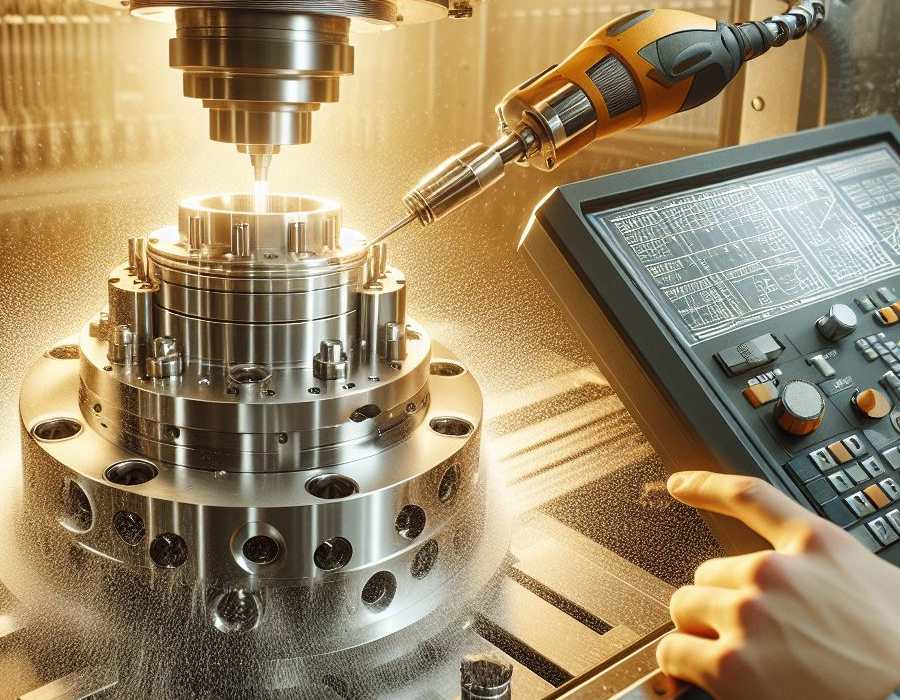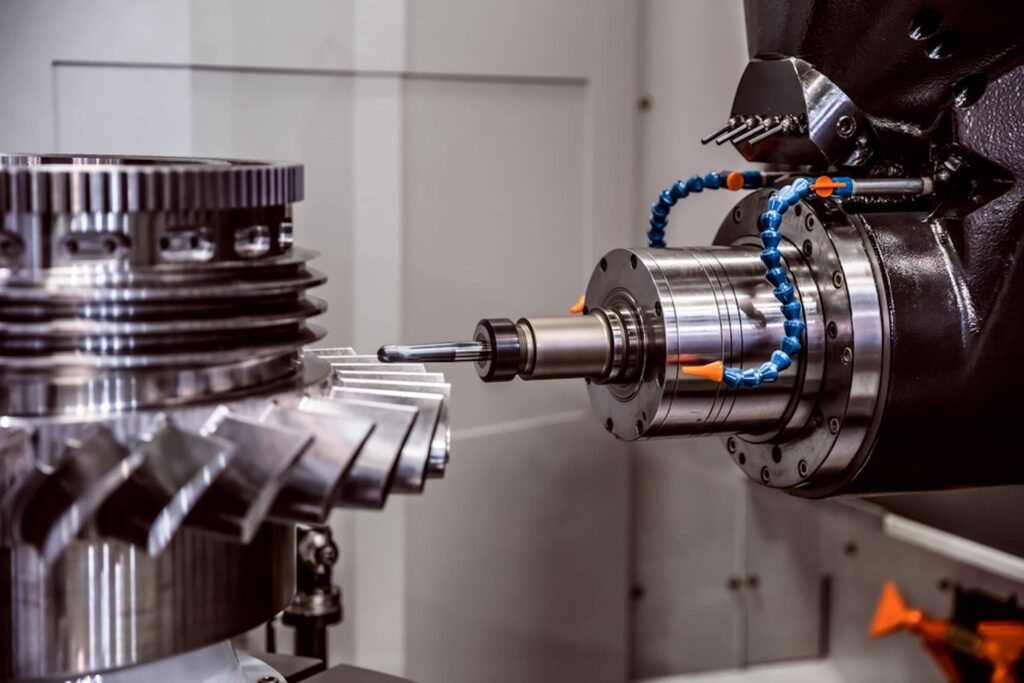How fast prototyping is transforming modern engineering
The Duty of CNC Machining Solutions in Modern Manufacturing and Design Solutions
CNC machining solutions have come to be vital in modern-day production and engineering. They provide accuracy and efficiency, allowing the development of complicated elements with minimal human oversight. This innovation not just decreases manufacturing time and expenses yet also addresses the raising demands of various markets. As innovation develops, the landscape of CNC machining is readied to change even more - fast prototyping. The ramifications of these developments require closer assessment
Recognizing CNC Machining: An Introduction
CNC machining, a foundation of contemporary production, involves making use of computer-controlled tools to precisely reduce and form materials. This modern technology incorporates sophisticated software program and machinery to automate the production process, making sure high precision and performance. CNC, which stands for Computer system Numerical Control, allows drivers to input detailed specifications that direct the maker in carrying out intricate designs.
Numerous materials, including steel, plastic, and wood, can be machined, making CNC flexible across various industries. The process starts with a digital model, generally developed using CAD software application, which is converted right into device language for implementation.
CNC machining encompasses several methods, such as milling, transforming, and exploration, each suited for particular applications. The fostering of CNC technology has transformed manufacturing capacities, making it possible for manufacturers to create detailed parts with minimal human intervention. Therefore, it has ended up being an essential component in industries ranging from aerospace to vehicle.
Benefits of CNC Machining in Production
CNC machining uses substantial advantages in manufacturing, particularly when it come to accuracy and accuracy, which boosts product top quality. Additionally, it is economical, enabling decreased manufacturing prices while maintaining high standards. Its versatility in handling various materials additionally highlights its value in modern production procedures.
Precision and Accuracy
In modern-day production, precision and accuracy are vital, and progressed machining methods play a necessary function in achieving these goals. CNC machining solutions supply unequaled consistency in production, permitting makers to produce complex components with specific specifications. By utilizing computer numerical control, these equipments get rid of human mistake, guaranteeing that each part satisfies rigorous tolerances. The repeatability of CNC machining makes it possible for organizations to generate large quantities of similar things without sacrificing quality. In addition, progressed software program used in CNC operations enables detailed designs and quick modifications, improving versatility in the manufacturing process. Eventually, the accuracy and precision provided by CNC machining considerably add to boosted product dependability and efficiency, fostering innovation and fulfilling the ever-evolving demands of different sectors.
Cost-Effectiveness
Cost-effectiveness stands apart as a substantial benefit of CNC machining in the manufacturing market. By automating the machining process, business can minimize labor prices and minimize human error, which results in higher performance. CNC makers run continuously and can create components at a quicker price than traditional techniques, eventually decreasing manufacturing prices. In addition, the precision used by CNC machining minimizes product waste, making certain that sources are made use of effectively. Consequently, services can attain greater earnings margins while preserving high-quality standards. Furthermore, the capability to create complicated designs with marginal configuration time additional improves cost efficiency. In general, CNC machining presents an engaging remedy for makers seeking to enhance their operations and continue to be competitive in a requiring market.
Adaptability in Products
Adaptability in materials is a hallmark of modern-day CNC machining, permitting producers to collaborate with a large variety of compounds, including steels, plastics, wood, and composites. This capacity allows the production of diverse parts tailored to specific application demands. For instance, light weight aluminum and stainless steel can be machined for robust commercial parts, while plastics are ideal for corrosion-resistant and lightweight applications. Wood machining deals with the furniture and decorative sectors, while composites supply strength-to-weight advantages in aerospace and auto industries. The ability to change in between materials without substantial reconfiguration enhances operations efficiency and minimizes preparations. Eventually, this versatility encourages manufacturers to innovate and fulfill developing market needs, strengthening CNC machining's role as a keystone of modern design remedies.
Key Industries Benefiting From CNC Machining Solutions
CNC machining solutions play a necessary function in various essential sectors, particularly aerospace and defense, in addition to auto component manufacturing. These industries depend on the accuracy and performance of CNC technology to satisfy rigid top quality and safety and security criteria. The capacity to produce complex get rid of limited resistances positions CNC machining as a crucial device in modern manufacturing.
Aerospace and Defense Applications
In the high-stakes domain of aerospace and precision, integrity and defense are paramount, making CNC machining services essential. These services enable the production of elaborate components with exacting tolerances, important for aircraft, satellites, and military devices. CNC machining facilitates the creation of lightweight yet durable components, commonly making use of site web sophisticated products such as titanium and carbon fiber. The capacity to swiftly prototype and manufacture components accelerates the growth cycle, making certain that essential systems are both reliable and reliable. CNC technology boosts repeatability, minimizing the danger of human error and making certain constant quality throughout big manufacturing runs. As the aerospace and defense industries significantly embrace automation, CNC machining services will certainly continue to play a crucial function in conference rigid regulatory requirements and operational needs.
Automotive Component Manufacturing
The automotive market, just like aerospace and defense, counts heavily on accuracy engineering to satisfy the needs of contemporary production. CNC machining services play a crucial function in generating high-grade automobile parts, such as engine parts, transmission housings, and personalized installations. These services allow producers to achieve limited resistances and complex geometries, necessary for enhancing car efficiency and safety. The ability to swiftly adapt styles and generate models via CNC machining accelerates advancement within the sector. In addition, the scalability of CNC machining allows helpful hints for both little set manufacturing and large manufacturing, dealing with diverse market requirements. As autonomous and electric cars gain traction, the dependence on CNC machining is positioned to expand, better strengthening its significance in automobile element production.
The CNC Machining Process: From Design to Production
Changing an electronic style into a tangible item entails a series of accurate action in the CNC machining process. At first, engineers utilize computer-aided design (CAD) software to develop a thorough electronic version of the wanted element. This design is then transformed into a layout compatible with CNC devices, usually through computer-aided production (WEBCAM) software program. The CNC maker interprets this information to direct its procedures.
As soon as the style is prepared, the selected product is secured in the CNC maker. The machining procedure begins, entailing different strategies such as milling, turning, and exploration, where tools get rid of material to shape the component according to specifications. Throughout manufacturing, the machine constantly monitors and changes for precision, assuring the last item meets the style standards.
After machining, components undergo completing procedures such as sanding or finish to enhance performance and aesthetics. This methodical technique guarantees that top notch parts are produced effectively and properly.
Innovations and Trends in CNC Machining Innovation
As developments in modern technology proceed to shape the manufacturing landscape, CNC machining is seeing considerable technologies that boost effectiveness and accuracy. One prominent trend is the integration of man-made knowledge and equipment learning, making it possible for flexible machining procedures that optimize tool paths and reduce cycle times. Additionally, the adoption of advanced products, such as compounds and light-weight alloys, broadens the abilities of CNC makers, enabling the manufacturing of complicated geometries with greater strength-to-weight ratios.
Cloud computer and IoT (Net of Points) innovations help with real-time tracking and data evaluation, leading to anticipating maintenance and reducing downtime. Automation through robotics is additionally becoming increasingly widespread, boosting and simplifying process safety in production environments. Finally, the surge of 5-axis machining provides exceptional flexibility and precision, allowing the production of detailed components in a single arrangement. These advancements jointly position CNC machining at the center of modern-day manufacturing solutions.

Future Overview: The Progressing Duty of CNC Machining in Engineering Solutions
CNC machining is poised to play a progressively crucial duty in engineering solutions as industries embrace advanced innovations and progressing market needs. As automation and clever production gain grip, CNC machining solutions are anticipated to incorporate with Net of Points (IoT) gadgets and man-made knowledge (AI) to boost accuracy and performance. This integration will permit real-time monitoring and predictive maintenance, reducing downtime and improving manufacturing performance.
Furthermore, the increase of personalized manufacturing will necessitate even more adaptable CNC systems qualified of adjusting to tiny set manufacturing with fast turnaround times. Sustainability problems will certainly also drive technologies in CNC machining, motivating the growth of environment-friendly products and processes.
Ultimately, CNC machining will certainly remain to develop, attending to the intricacies of contemporary engineering obstacles while supplying affordable and scalable solutions that fulfill the diverse requirements of industries investigate this site varying from aerospace to health care.
Frequently Asked Inquiries
What Materials Can CNC Machining Deal With?
CNC machining can work with a variety of products, including steels like light weight aluminum, titanium, and steel, in addition to plastics such as acrylic and nylon. Additionally, timber and composites are likewise ideal for CNC machining processes.
Just how Do I Select a CNC Machining Solution Supplier?
When selecting a CNC machining company, one must consider their experience, equipment high quality, product abilities, consumer reviews, turn-around times, and pricing. A thorough comparison assures the chosen supplier fulfills particular job requirements properly.
What Is the Typical Turnaround Time for CNC Machining Projects?
Regular turnaround times for CNC machining projects vary, usually ranging from a few days to numerous weeks, depending on project intricacy, product availability, and the solution company's work. Timelines need to be confirmed straight with the chosen company.
Are There Minimum Order Quantities for CNC Machining Services?

How Does CNC Machining Ensure Accuracy and Accuracy in Manufacturing?
CNC machining assurances accuracy and precision through computer-controlled procedures, which lessen human mistake. Advanced software program and top quality equipment assist in specific measurements, constant replication, and intricate styles, causing premium parts that meet rigid specifications and resistances.
CNC machining, a foundation of modern-day production, includes the use of computer-controlled tools to precisely cut and form materials. CNC machining solutions offer unmatched uniformity in production, enabling manufacturers to produce complicated components with specific specs. CNC machining services play a necessary duty in various vital industries, particularly aerospace and protection, as well as vehicle element manufacturing. Additionally, the scalability of CNC machining allows for both tiny set manufacturing and large-scale manufacturing, catering to diverse market needs. As automation and wise production gain grip, CNC machining solutions are anticipated to incorporate with Net of Things (IoT) tools and artificial knowledge (AI) to enhance accuracy and efficiency.